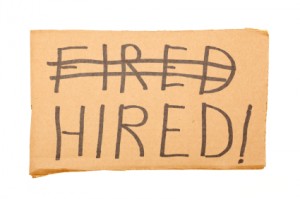By Dan Simmons
Welcome to our “Get Hired, Not Fired” series. What we’ll be focusing on in this series is dealing with standard parts of the interview and hiring process during post-recession economic conditions (which may last for quite some time). In other words, these are the things that “nobody is telling you,” namely because the rules have changed and not a lot of people are aware of the corresponding changes they have to make.
We’ll start our series with the resume, which is designed to help you get your foot in the door for a face-to-face interview. A word of warning before we begin: creating resumes in today’s climate is more work than it’s been in the past. Greater effort must be made in order to stand out from an ever-increasing crowd. With that in mind, here are some interview tips that “nobody is telling you”:
- Customize your resume—What does that mean? One job application, one resume . . . one different resume. Writing one standard resume and then sending it out all over the place will not distinguish you and will actually reduce your chances for an interview. Dissect the job description and tailor an individual resume to address the requirements of that description. Repeat as necessary.
- Individualize your skills and talents—Now what does THIS mean? Just like your resume needs to be unique, so does the way in which you describe your set of skills. Don’t use generic terminology. Instead, tie your skills to quantifiable accomplishments and describe them in such a way as to make them both unique and relevant.
- Presentation is important—Hiring managers are looking through thousands of resumes at a glance. If you use the same format as everybody else, your resume will blend in with everybody else’s. It will get “lost in the shuffle,” so to speak. Yes, it needs to look clean and crisp, but it should also be attractive and inviting (i.e., easy to read or scan).
- Pick and choose your references—Once again, customization is preferable. Having three professional and three personal references won’t cut it. Have 10 of each, and pick and choose different ones, in accordance with the jobs for which you apply. Some references probably lend themselves better to certain jobs than to others. Be aware of this and use it to your advantage.
The rules have changed, and job seekers must change with them. Competition is fierce, and new measures must be taken in order to set yourself apart from that competition. Be individual, be unique, and be willing to do what it takes to get hired in today’s job climate.
"What Nobody is Telling You" is an article series put on by Continental Search.

Frequently Dan also is a recruiter trainer and has been featured at various Top Echelon Conventions and online as a speaker for various webinars. He has also been published in The Fordyce Letter the recruiting industry’s #1 magazine.
Is Your Company Looking for Great Candidates? Contact Dan Today!






